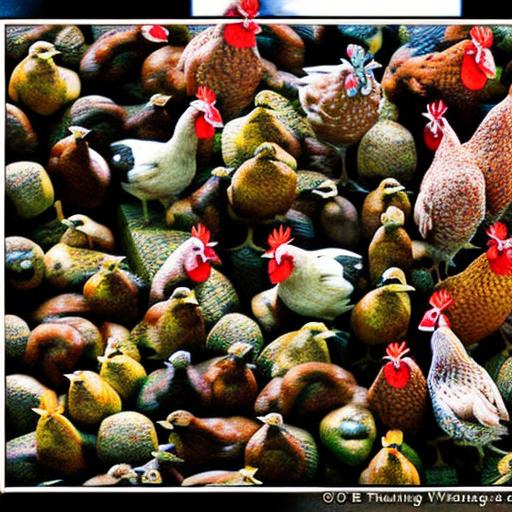Urban chicken farming has been gaining popularity in cities across the United States, including New York City. More and more people are choosing to raise chickens in their backyard for various reasons, such as the desire for fresh eggs, sustainable living, and educational opportunities for children. I personally have been involved in urban chicken farming for the past five years and have found it to be a rewarding and fulfilling experience.
Key Takeaways
- Urban chicken farming is becoming increasingly popular in New York City.
- There are legal requirements for keeping chickens in NYC, including obtaining a permit and following specific guidelines.
- Certain chicken breeds are better suited for urban environments than others.
- Housing and coop requirements for urban chickens in NYC include providing adequate space and protection from predators.
- Feeding and caring for chickens in a city setting requires attention to their dietary needs and health considerations.
Legal Requirements
Before starting an urban chicken farm in NYC, it is important to be aware of the legal requirements. Permits and licenses are needed to legally keep chickens in the city. Additionally, there are zoning regulations that dictate where chickens can be kept and how many can be kept on a property. It is also important to follow health codes to ensure the safety and well-being of the chickens and the surrounding community.
Choosing the Right Chicken Breeds
When choosing chicken breeds for an urban environment, it is important to consider factors such as noise level, space requirements, and temperament. Some breeds are better suited for urban environments due to their ability to adapt to smaller spaces and their quieter nature. Personal recommendations for urban chicken breeds include the Rhode Island Red, Australorp, and Sussex.
Housing and Coop Requirements
The size and design of the coop is an important consideration when setting up an urban chicken farm. The coop should provide enough space for the chickens to move around comfortably and should be designed in a way that allows for easy cleaning and maintenance. Materials such as wood or metal can be used to build the coop, but it is important to ensure that it is secure and predator-proof. The location of the coop should also be carefully chosen to provide adequate sunlight and protection from extreme weather conditions.
Feeding and Caring for Chickens
Proper nutrition is essential for the health and well-being of chickens. They should be fed a balanced diet that includes a mix of grains, vegetables, and protein. It is important to provide fresh water at all times and to clean and refill the feeders and waterers regularly. Daily care routine includes checking for any signs of illness or injury, cleaning the coop, and collecting eggs.
Health and Safety Considerations

Urban chickens are susceptible to a variety of health issues, including parasites, respiratory infections, and nutritional deficiencies. It is important to take preventative measures such as regular cleaning and disinfecting of the coop, providing a balanced diet, and monitoring the chickens for any signs of illness. If a chicken does become sick, it is important to seek veterinary care and follow their recommendations for treatment.
Dealing with Noise and Odor Complaints
One of the concerns that neighbors may have about urban chicken farming is the potential for noise and odor. There are several tips for minimizing noise and odor, such as keeping the coop clean, using absorbent bedding materials, and providing adequate ventilation. If neighbors do have complaints, it is important to address them in a respectful manner and take steps to mitigate any issues.
Benefits of Urban Chicken Farming
There are numerous benefits to urban chicken farming. One of the main benefits is the availability of fresh eggs and meat. Chickens raised in a backyard setting are able to roam freely and eat a natural diet, resulting in eggs that are higher in nutrients and taste better than store-bought eggs. Urban chicken farming also promotes sustainable living by reducing food waste through composting and providing natural pest control in the garden. Additionally, raising chickens can be an educational opportunity for children to learn about responsibility, animal care, and where their food comes from.
Challenges and Limitations
While there are many benefits to urban chicken farming, there are also challenges and limitations to consider. One of the main limitations is space. Backyards in urban areas are often small, which can limit the number of chickens that can be kept. Noise and odor concerns are also a challenge, as neighbors may not appreciate the sounds and smells associated with chickens. Predators and pests can also pose a threat to urban chickens, so it is important to take precautions to protect them.
Resources and Support
There are several resources and support available for urban chicken farmers in NYC. Local organizations and groups provide information, workshops, and networking opportunities for those interested in urban chicken farming. Online resources and forums are also available for advice and support from experienced chicken farmers. Personal recommendations for support and advice include the New York City Chicken Keepers Facebook group and the Urban Chicken Podcast.
In conclusion, urban chicken farming is a growing trend in cities like New York City. It offers numerous benefits such as fresh eggs, sustainable living, and educational opportunities. While there are legal requirements, choosing the right chicken breeds, providing proper housing and care, and addressing health and safety considerations are all important aspects of successful urban chicken farming. Despite challenges and limitations, there are resources and support available to help navigate the world of urban chicken farming. Overall, it is a rewarding and fulfilling experience that I highly recommend trying.
If you’re interested in keeping chickens in NYC, you might also want to check out this informative article on Poultry Wizard about feeding geese. Geese can be a great addition to your backyard flock, and this article discusses whether geese can eat chicken feed and provides helpful insights on their dietary needs. To learn more, click here: Can Geese Eat Chicken Feed? Additionally, if you’re planning to build a chicken coop, Poultry Wizard has an article that explores the best flooring options for your coop. Discover the pros and cons of different materials and make an informed decision for your chickens’ comfort and health. Read more here: Choosing the Right Floor for Your Chicken Coop. Lastly, if you’re considering adding ducks to your urban farm, Poultry Wizard has a comprehensive guide on what to feed ducks. Learn about their nutritional requirements and find out which foods are safe and beneficial for these delightful waterfowl. Find out more at: What Should You Feed Ducks?
FAQs
Can you keep chickens in NYC?
Yes, it is legal to keep chickens in NYC, but there are certain regulations that must be followed.
What are the regulations for keeping chickens in NYC?
The regulations for keeping chickens in NYC include obtaining a permit from the Department of Health and Mental Hygiene, keeping no more than six chickens, and ensuring that the chickens are kept in a clean and sanitary environment.
Where can you keep chickens in NYC?
Chickens can be kept in backyards, rooftops, and other outdoor spaces as long as they meet the regulations set by the Department of Health and Mental Hygiene.
What are the benefits of keeping chickens in NYC?
Keeping chickens in NYC can provide a source of fresh eggs, help with pest control, and provide an educational opportunity for children and adults.
What are the potential drawbacks of keeping chickens in NYC?
The potential drawbacks of keeping chickens in NYC include noise complaints from neighbors, the cost of maintaining the chickens, and the risk of attracting predators such as rats and raccoons.
What do you need to know before getting chickens in NYC?
Before getting chickens in NYC, it is important to research the regulations, obtain a permit, and ensure that you have the space and resources to properly care for the chickens. It is also important to consider the potential impact on neighbors and the surrounding environment.
Meet Walter, the feathered-friend fanatic of Florida! Nestled in the sunshine state, Walter struts through life with his feathered companions, clucking his way to happiness. With a coop that’s fancier than a five-star hotel, he’s the Don Juan of the chicken world. When he’s not teaching his hens to do the cha-cha, you’ll find him in a heated debate with his prized rooster, Sir Clucks-a-Lot. Walter’s poultry passion is no yolk; he’s the sunny-side-up guy you never knew you needed in your flock of friends!







